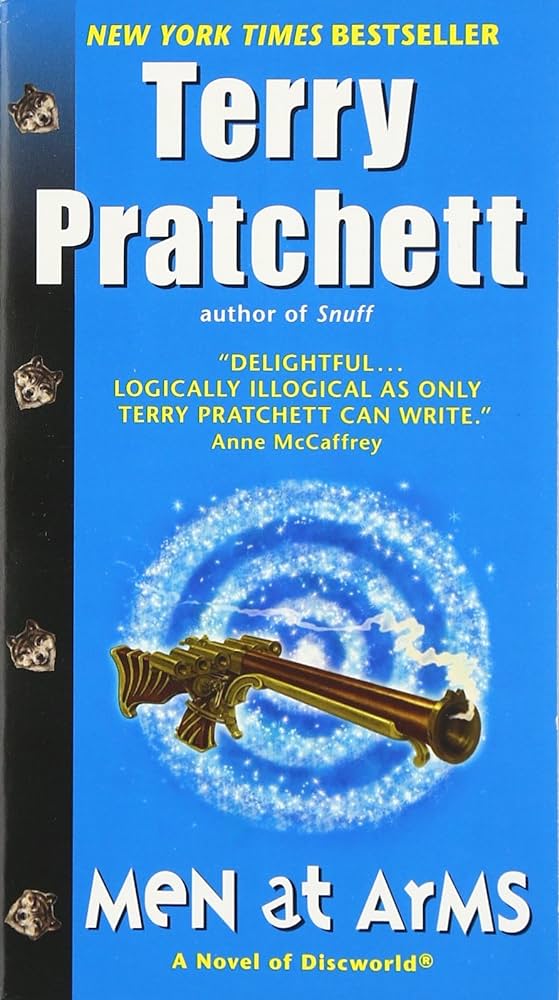Note: If you wish to receive, via e-mail, (1) my weekly newsletter or (2) daily copies of these posts, notify me at rrbates1951@gmail.com and indicate which you would like. I promise not to share your e-mail address with anyone. To unsubscribe, send me a follow-up email.
Tuesday
I’ve been listening to Terry Pratchett fantasy novels as I drive around and have just come across one that helps explain rightwing America’s obsession with guns. Pratchett is to fantasy what Douglas Adams is to science fiction—a devastatingly witty satirist who takes on issues of modernism in the guise of familiar genre—and in Men at Arms he grapples with authoritarian impulses.
The 1993 novel seems particularly relevant to today as it pits a complex multicultural society against longing for an all-powerful ruler. On the one hand, there are Diversity, Equity, and Inclusion mandates for the Night Watch, which decree that the police force should be open to non-humans as well as humans. This includes trolls, dwarfs, vampires, zombies, and werewolves. While the mix causes internal problems, especially because trolls and dwarfs are traditional enemies, ultimately it works to society’s advantage in that a diverse police force is more effective at handling social unrest (including brawls between trolls and dwarfs). The novel stands in noted contrast to Lord of the Rings, where goblins and trolls are bad and dwarfs and elves are good.
Indeed, Pratchett appears to be writing a deliberate response to Tolkien, who in his fiction longs for a pre-World War I world where yeoman farmers live in rural peace. Much of the drama in Pratchett’s novels involves members of various species learning to move past their quarrels and appreciate the richness that diversity offers.
Traditionalists, however, are appalled at these modern developments and long for “the return of the king” (to quote Tolkien), a return to the past where “species bias” is acceptable. They long for a man (and in there minds it has to be a man, not to mention a human) who can pull a sword out of a stone. Sadly, one of these traditionalists has access to a new weapon known as “the gonne.”
The gonne has been invented by Leonard da Qvirm, who is based on Da Vinci, and unfortunately it proves to have a life of its own. In this way, it is very much like “the one ring to rule them all.” When one man succeeds in wresting it from another (as Isildur wrests the ring from Sauron), he himself becomes possessed by it. In adapting Tolkien’s drama, Pratchett helps us understand our own gun fanatics.
The power of the gonne becomes especially clear to Samuel Vimes, head of the Night Watch, when he wrestles it from the grasp of a man who is trying to kill him with it, not to mention overthrow the government. Although Vimes believes passionately in the law, that belief starts to drop away when he has the gonne in his hand. In fact, the metal tube actually speaks to him and tries to act of its own volition as it turns on the head of the Assassins Guild, its previous possessor:
You’re mine.
We don’t need him anymore.The shock of the voice was so great that [Vimes] cried out.
He swore afterwards that he didn’t pull the trigger. It moved of its own accord pulling his finger with it. The gonne slammed into his shoulder and a six-inch hole appeared in the wall by the Assassin’s head, spraying him with plaster.
The gonne doesn’t stop there but keeps attempting to seduce its new possessor:
All that you hate, all that is wrong—I can put it right.
And:
Shoot them all. Clean up the world….
But…why not? Why not fire? Who was this man? He’d always wanted to make the city a cleaner place, and he might as well start here. And then people would find out what the law was…
After Vimes manages, barely, to escape the deadly attraction of the weapon, he reflects on its power:
No wonder no one had destroyed it. You couldn’t destroy something as perfect as this. It called out to something deep in the soul. Hold it in your hand, and you had power. More power than any bow or spear—they just stored up your own muscles’ power, when you thought about it. But the gonne gave you power from outside. You didn’t use it, it used you.
Gun supporters in this country are fond of saying, “Guns don’t kill people. People kill people,” as though this excuses them from regulating firearms. Pratchett makes it clear that guns do in fact kill people, preying on us the way that, say, drugs do. They feed upon fantasies of power and invulnerability and, in the process, lead to an epidemic of gun deaths. America has experienced between 40-50,000 gun deaths in each of the past three years.
In Pratchett’s novels, the gonne is considered so dangerous that it is buried away where no one will ever find it. Now that’s the kind of fantasy I can get behind.


